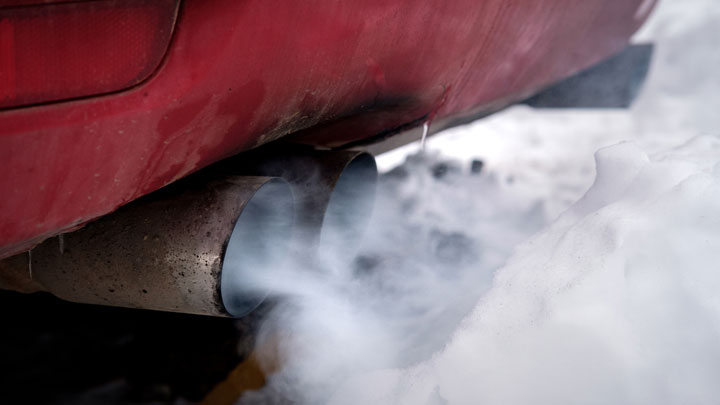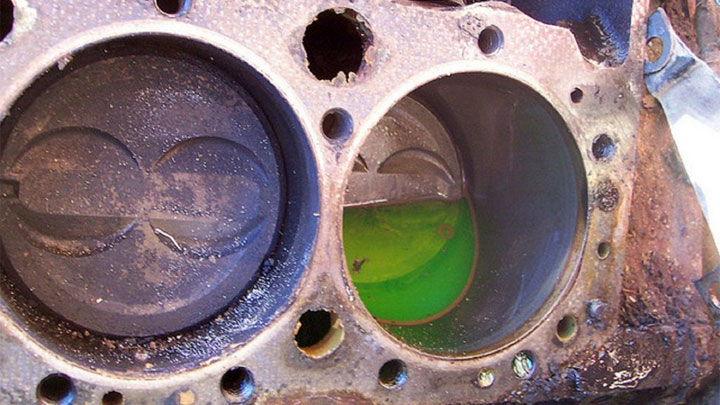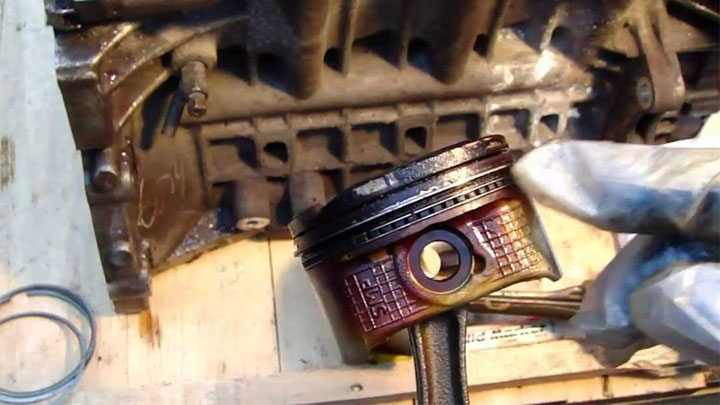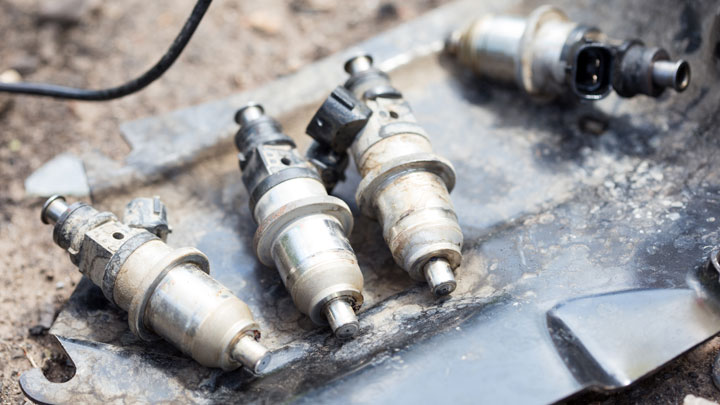5 Causes of Car Blowing White Smoke from Exhaust
White smoke from your car’s exhaust can mean harmless moisture or an urgent engine problem. But it’s a good idea to not assume the first so don’t ignore it.
While the reason for the white smoke from your exhaust may be harmless, other causes may require immediate attention to avoid costly repairs. Read on to learn how to diagnose the issue.
5 Causes of White Smoke Blowing From Car Exhaust
#1 – Condensation

This is a common occurrence, especially in colder climates. When it’s cold outside and you notice white smoke at startup, then you probably have nothing to worry about.
When the warm or hot exhaust gases meet cold outside air, condensation and steam is a result. After a short amount of driving, the white smoke should lessen.
It’s common for drivers who have lived in a warm climate like California and then move to colder region to worry about this but it’s harmless and perfectly normal.
#2 – Coolant Leak

If you continue to see white smoke coming out of the pipe after the engine has had a chance to warm up or while accelerating, then your coolant might be leaking internally.
The most noticeable symptom of internal coolant leakage is when the white smoke is billowing out of the exhaust pipe and leaves a sweet odor in the air. If you the white smoke consistently comes out and the sweet odor smell is present, then it is definitely a problem with your coolant leaking.
The reason why coolant usually leaks is because there could be a crack in the cylinder head or even engine block. Even if the crack is small, the internal coolant can easily leak out and contaminate the oil of your engine. This is how the exhaust smoke ends up turning white.
The combination of the coolant and engine oil will create a milky appearance in the smoke. All it takes is for just a little bit of coolant to get into the combustion chamber for white smoke to be produced.
Once you have a low coolant level and a cooling system that isn’t being maintained properly, your engine will begin to overheat. This will cause your head gasket to fail because they won’t be able to seal properly when they’re overheated.
As a result, your engine will get worn out much faster and its internal components will get damaged.
#3 – Piston Ring or Valve Seal Leak

Leaking valve seals or piston rings are another possibility when it comes to smoke. In this case, bad seals or piston rings cause oil to leak into combustion chamber which then mixes with fuel and burns. The result is a white or light bluish smoke that comes out from exhaust manifold.
If you want to fix this white smoke problem, the easy solution is to take your vehicle to the nearest auto body shop as soon as you notice it. But if you are trying to fix this yourself, never try to remove the coolant reservoir cap with the car still running because the engine will be too hot and it will cause you serious injury.
Once the car has had a chance to cool down, check the reservoir and see what the coolant level is at. If the coolant appears to be at the normal level, then you’ll need to have a cooling system pressure checked performed so you can pinpoint where the coolant leaks are coming from.
#4 – Bad Fuel Injector

A faulty fuel injector, usually one that is stuck open or is leaking from the o-ring, will deliver too much fuel to the combustion chamber. This excess fuel cannot properly burn in the engine and instead comes out as white or gray smoke out of your tailpipe.
Replacing the bad injector (or its o-ring) is the solution.
The hard part is figuring out which fuel injector is bad so depending on vehicle mileage, many mechanics will recommend replacing all the injectors since they’re not very expensive in most cases.
#5 – Incorrect Injector Pump Timing (Diesel Engines)
A diesel engine requires precision timing and fuel pressure of the injector pump. When the timing is not what it’s supposed to be, your engine will essentially be running rich which will cause fuel to not completely burn and instead exit out of the exhaust as white or gray smoke.
See Also: P2002 Code (DPF Issue)
- Replace the Engine or Replace the Car? (11 Factors to Consider) - Apr 11, 2024
- Plastic Piece Dragging Under Your Car? (What It Is and What To Do) - Mar 21, 2024
- Timing Belt vs Timing Chain (What’s the Difference?) - Feb 27, 2024

After replacement of my head gasket White smoke coming from my exhaust and it’s a lot..
It only comes out when driving the car for about 30 minutes at 100km/p.. Can anyone perhaps tell meh what’s the problem, it’s
Who replaced the head gasket? Are you losing coolant over time?
I have a 2002 MB ML320. she’s an old grandma now…21 car years is 80+ in human. anyway, low miles, 112,000+. just recently started blowing white smoke on cold start. mostly after it sits overnight. the odor of the smoke is definitely NOT sweet. it’s more like the odor you smell when the city is repaving the asphalt. i’m not too worried about it. the vehicle runs fine otherwise. the smoke goes away after a few seconds.
It’s probably fine if the smoke goes away when the vehicle warms up. How much smoke are we talking about?
Thanks for the great posts and insightful comments. I have an ‘04 fx35 Infiniti. Recently changed the top gasket and cylinder heads after an overheating problem. Once repairs were completed, engine oil got topped up and immediately started billowing out white smoke. Did a complete oil change and the smoke persists. When engine is cold, smoke is absent but starts as soon as engine gets warm. Usually ceases after car has been fired during a drive. Starts coming out again if car is slowed down and resumes acceleration. So once the engine is warmed up, the white smoke pours out even when the car is stationary and just idling. Please is the engine worn out? Or could there be a leak from the valve seal? Thanks!
It sounds like you could be burning coolant. If your coolant level is dropping at all (in the radiator or overflow tank) I would go back and check your work on the heads. Perhaps the head gasket wasn’t installed correctly, or maybe the heads are warped. I would measure the heads to make sure they are flat, and probably the same with the block just to check.
Thank you for the article. My Kia Rondo 2008, after a long drive, the next start will have white smoke coming out of the exhaust pipe. After a few minutes, the white smoke goes away. If keep driving a short distance in my town, it’s just normal, no smoke. But after another 40 min high way drive, the next start will have smoke again. No checking light on, no overheating, no fluid level goes low, no engine roughness. Any thoughts on this? Should I spend $165 to have a repair shop do an inspection? Thanks in advance!
correction, not a few minute, but a few seconds, the white smoke goes away
If you’re worried you can do an inspection. A little white smoke on cold start is often not a big deal if the car is otherwise running fine.
Hello, were you able to know what was wrong? I have a kia sedona with same issues. Please help. Thanks
Kia grand carnival
Lots of white smoke when I start the car after it’s had a drive and been sitting for a few hrs.
I’ve had it at a few mechanic and they can’t find out why
No losing any fluids
Doesn’t over heat
Smoke doesn’t smell sweet but it does have an odour to it.
Runs beautifully but the white smoke if anyone can help be great as 3 different mechanic have no idea.
Does the car still smoke after it’s warmed up?
I changed my engine oil and the car started giving white smoke from the exhaust pipe. What could be the cause
I don’t know. Changing oil shouldn’t do that. Was it cold? Are you sure you loosened the correct drain plug, and poured the oil in the right place?
Hey guys. Appreciate the insightful post. I have a 2013 328i xDrive (F30) and started noticing white smoke from the exhaust but only on startup and only after it’s been sitting for a little while (a few days at least). We’re in July/August in the Mid-Atlantic so I don’t think it’s condensation. I got new brakes and an oil change in June and my mechanic recommended topping up the coolant. I did this for the first time since buying the vehicle 7 years ago. The coolant bottle I got was very full and I ended up splashing it on the engine block and elsewhere around the coolant tank a bit. I’ve been checking the coolant level every couple of days and it’s stayed at the same level I filled it to (max).
Any ideas?
Does the white smoke go away once the car warms up?
I have a BMW 750i that blows a bit of white smoke out the duel exhaust, especially when I accelerate. I have read that it might be the head gasket and coolant is mixing with oil. Is there a treatment I can add to remedy this problem? Can you suggest a product?
I would make sure I was treating the correct problem first. You can do a leak down test to determine if it’s a head gasket failure. Some have had luck with stop leak or head gasket sealer, but personally I would want a more thorough and permanent fix for an issue like that.
I have a 2015 Kia Forte. Never had any issues before last night when I turned out of a parking lot and upon trying to accelerate, white smoke started pouring out of the tailpipe and it wouldn’t accelerate. When I pulled over, I heard a knocking noise from the engine and my engine light came on. I turned the car off and then tried to start it again but it wouldn’t start. Looked under the hood and didn’t see any smoke so I tried starting again and it started just fine. No more engine light and seems to be running fine since. Any ideas? I did get gas about 30 minutes before this and I noticed my coolant cap wasn’t secure but I’m not sure either of those things matter.
If your coolant cap wasn’t secure, you could have been losing coolant that way. Perhaps this is where the white smoke came from. At the very least, check your coolant level and top it up if it’s low. Make sure you don’t remove the radiator cap while the radiator is hot.
2001 Honda CRV after driving awhile will blow white smoke out the exhaust when pulling away from the stop at the light. Then it stops. What could be causing this please?
Does the car do this both on cold start and after it’s warmed up? Do you notice any other symptoms along with the white smoke?
Hi Sean
My 2011 VW Transporter does the same. No smoke when the engine is cool, but once up to temperature it puffs white smoke when pulling from stopped or slow speeds.
No other symptoms except a smell of diesel outside the car when you park.
Thanks
I have a vw GOLF RABBIT SDI 1HS diesel, .when I start the vehicle in the morning everything comes ok and it idles good,if I drove for a while and stop,switch off the engine and try to start again,it will start but idles very poor and the oil and the heater lights on the dash board will be on continuously blinking.if I switch it off and wait for some hours when the engine is cool and start the car it will idle good and the warning lights will not be on blinking.i was told to change the oil suction pump which I did and still the same problem is persisting.pls I need some help
Hello, my golf 6 1.6 TDI is showing white smoket from 4th injector on the motor, not always and just a small amount, is it dangerous and should I replace my injector ?
How can you tell the white smoke is coming from the 4th injector?
Scratching our heads! Volvo 3.2 (2010 S80) 134k miles, well taken care of, has misfire at startup and some white smoke which lasts only while engine is doing its initial high revv for 30-45 seconds, and once at normal running RPM no smoke or misfire. Runs quite well, quick. We looked at the top of the cylinders with a scope expecting to see a shiny piston head but they all look normal! I see an earlier post where you mention a bad injector could cause white or gray smoke (I had always heard ‘black’ from rich fuel), was curious your thoughts, in general, and about the bad injector and white smoke – condensation? It did code one time and, I believe, it pointed to one of the injectors. swapped the one with one next to it, no more code. No coolant loss per se (had to put some in once in 3000 miles as it had barely dropped below the minimum line, no evidence of exhaust pushing coolant up into the reservoir tank. No coolant in oil and vice versa. I understand coolant, by design, is not used to cool the intake manifold(?), we haven’t run a test on it. Any thoughts you have would be awesome. Thank you.
Some vehicles do cool the intake manifold with coolant, and this can be a source of leaks for some. Not all intake manifolds have water jackets in them, though (the passages where coolant flows).
Have you experienced any overheating issues with this vehicle?
Mine is the same as KG minis injector and misfire. Just had the oil changed, no low levels and no overheating. Only has white exhaust smoke at startup for a minute then goes away for the rest of the day. It only happens at the first startup of the day. I’m at a loss, have no idea…
1978 Toyota FJ40. 2F Engine. Was parked for about a year, and after starting, it’s putting out quite a bit of white smoke and wants to stall when shifting into second gear. Getting some backfires as well. Early thoughts?
How old is the gas in the tank? I would expect a bit of white smoke when you haven’t run the vehicle in a while, but it should clear up by the time the vehicle reaches operating temperature.
My isuzu crosswind 2001 like others its blown white smoke when start it up in the morning, can i still used my car for the meantime?
How cold is it outside? Most cars will blow white smoke on startup when it’s really cold.
White smoke coming from my exhaust and it’s a lot..
It only comes out when driving the car for about 30 minutes at 100km/p.. Can anyone perhaps tell meh what’s the problem, it’s a Peugeot 207 1.6 xs
Sounds like you’re burning something. Are you needing to top off any fluids more than usual (such as coolant or oil)? You could always try a leak down test. A leak down test will help you narrow it down if you are losing compression and burning oil or coolant somewhere.